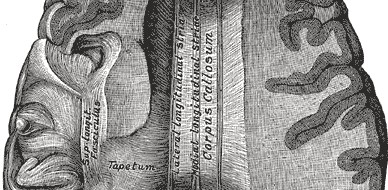Zachary Goldberger (he/him) wears many hats as Associate Professor, Associate Chief (Education), and Program Director, Cardiovascular Medicine Fellowship in SMPH’s Department of Medicine Division of Cardiovascular Medicine. Several of his musical compositions—Solo Piano, Untitled (Spring 2021), Solo Piano, Untitled #2 (Fall 2021), Solo Piano, Untitled #3 (Spring 2022), Solo Piano, Untitled #4 (Fall 2022), Wedding Day (Fall 2023)–have been published in Corpus Callosum.
Editor’s note: the terms art and artists are used as umbrella terms in this context and include musicians and songwriters/composers.
Question 1: What drew you to music and what is your background in it?
Goldberger: I began banging on the piano when I was 2 years old, and began taking lessons when I was 4. I continued lessons into high school, and am classically trained. I have self taught myself some jazz and blues, but I don’t consider myself overly skillful in any discipline. One of my regrets is not having practiced more when I was younger. I only began to truly appreciate classical music as an adolescent. Learning a Bach Invention or a Brahm’s intermezzo—or any piece of music, really—would take me months and months now. The ability to improve plasticity when younger is incredible—I notice that with my 3 kids who are taking lessons, who learn a new song in weeks. Most of the music I listen to now is way beyond my skill level. So, I compose what I can play, and vice versa. To some extent, this is good, because the simplest melodies are often the most lyrical.
Question 2: What motivates you to create and what inspires your art?
Goldberger: I composed my first piece when I was 7. One of my classmates wrote lyrics for it (“I Love Colors”). It was in the key of C major, and only has 3 chords. I have composed music since that time. The creative process has always been a source of mystery. I don’t remember actively trying to write a song. I often land on a harmonic progression when I sit at the piano without an agenda, and the melody is often borne out of that series of chords. Every time I play a prior composition, I play it slightly differently, and I don’t write out the music.
Question 3: Do you have any favorite artists or art that have influenced you and who/what are they?
Goldberger: I’m a huge music enthusiast in all genres, and many artists have been influential. But a few stand out. First hearing (and continuously listening to) Keith Jarrett’s solo improvised concerts was a transformative experience. Most singer/songwriters that make the piano a seminal instrument in their work have also been influential. Billy Joel, Bruce Hornsby, Marc Cohn. Brad Mehldau is another of my favorite jazz pianists; he does brilliant improvisations on both popular and classical music in addition to his own compositions. I try to do that as well. I also have the deepest respect for film scorers. Randy Newman, Justin Hurwitz, Carter Burwell. I often find myself doing a thought experiment, where if I were stranded on a desert island, able to bring only one work of music, what would it be? It changes between Bach’s Well-Tempered Clavier (Books I and II) and Beethoven’s piano sonatas. (Hopefully I’ll never have to make that choice!)
Question 4: How do you balance your art with the rest of responsibilities in your life and does art help you in those other arenas of your life?
Goldberger: I don’t find it hard to balance music and other responsibilities—this largely because I don’t sit down at the piano as much as I’d like to. Some of my colleagues and friends make musical performance a much more constant part of their life. In contrast, I’d say that writing music and being able to play piano definitely helps me achieve balance. After spending a good chunk of time reading ECGs or charting, taking a break to play piano, even for 15 minutes, changes everything.
Question 5: What is next for your art (anything you are working on now or planning to)?
Goldberger: I have enough music composed where I would like to record it and release it. I had two CDs of solo piano compositions produced through a small record company based in Wellesley, MA when I was just graduating high school and as a freshman in college. If I could get back to doing that, I would. 50% pianist/50% cardiologist would be nirvana. My understanding is that releasing CDs is not the way it’s done now; many simply upload to Spotify. Maybe I’ll start there.
Question 6: Do you have any advice for anyone curious or interested in getting into creating and making music who hasn’t before?
Goldberger: Clara Schumann once remarked, “There is nothing greater than the joy of composing something oneself and then listening to it.” I couldn’t agree more. Learning a new instrument and having the freedom to move your fingers anywhere you want is completely worth the time.
